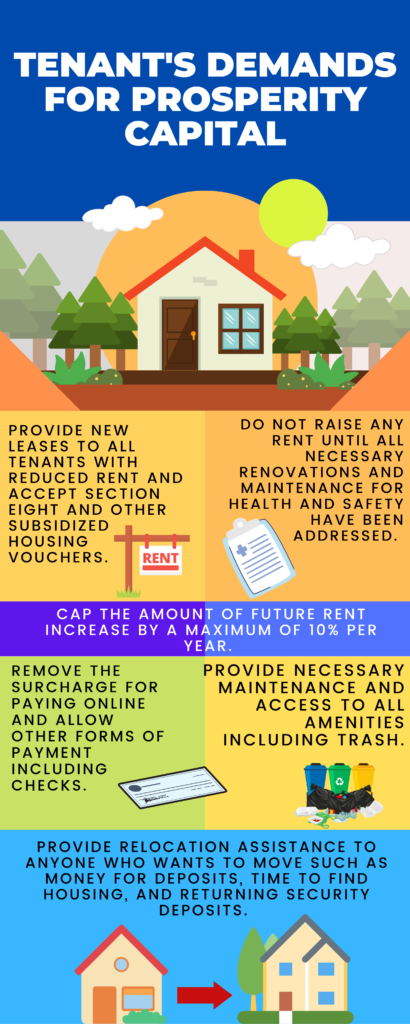
Eviction emergency: rent increases leave tenants distraught
When a letter arrived in the mail informing Lexington Gardens resident Barbara Daniel that she had to vacate her property within the next 30 days, she was initially shocked and confused. What she didn’t know was that her house, along with hundreds more in Athens that generally housed low income residents, had been purchased by Florida based investment group Prosperity Capital Partners. After the acquisitions Prosperity Capital, who did not respond to a request for an interview, raised rent almost 93%, from $825 to $1,595 per month.
Daniel knew that Prosperity Capital had violated Georgia law by not giving 60 days notice on evictions, so after she wrote a letter to Prosperity Capital and received no response she sought outside help.
“They gave me 30 days’ notice and I wrote them a letter saying I wasn’t going anywhere. So the Department of Community Affairs got in touch with them and said they had to give me 60 days,”
Daniel said.
The problems for tenants affected by Prosperity Capital are not new or unique to them, and they are part of a larger trend in Athens and the country as a whole.
Rising home prices
Over a three year period from October 2019 to 2022, the median price of a home in Athens-Clarke County rose from $199,000 to $306,280, an increase of about 50%. Home prices had been rising steadily since the 2008 financial crisis, but the COVID-19 pandemic caused a large spike. A main cause of this trend was the record low mortgage rates during the pandemic. If a person bought a home in 2019, they paid significantly higher interest rates towards their mortgage than if they bought in 2020 after rates plummeted in the spring.
Local realtor Joe Polaneczky, owner of Nabo Realty, says that another factor driving the housing boom was low supply and extremely high demand
“We didn’t have an inventory of homes built up, and the demand for housing to buy was really high so anything that went on the market for sale typically sold very quickly,” Polaneczky said.
This drought caused homeseekers to spend more and more on any homes that they could find.
One factor unique to Athens is the University of Georgia, which some see as a main contributor to high housing prices. A common local complaint is that more parents of UGA students are paying for their children to rent houses at higher rates and driving up prices. Some are buying the houses themselves to sell later to offset the costs of sending their children to UGA.
“For a wealthy family, the difference between paying $650 a month for their kid to live in a property or $900 a month is no big deal to them,” Polaneczky said.
Most rent and mortgage rates in the Athens and Atlanta areas do not meet standards of affordable housing. To be considered affordable, monthly rent or mortgage rates on a home or apartment cannot exceed 30% of a tenant’s income. This shift is turning many low income tenants away from affordable housing and making it difficult for citizens, especially younger homeowners, to find and keep their homes. As tenants are evicted from their homes, homelessness rates in Athens continue to rise, according to Athens Homeless Coalition.
Local pushback
After receiving eviction notices, tenants sought out community help to push back against Prosperity Capital’s rent increases and evictions. One of these organizations was The Young Democratic Socialists of America in Athens.
“We believe that housing should be a human right. We also think that capitalism is the problem. Obviously we can see the profit motive pushing people out of their homes and there being no solution for these people because of profit motive,” Erin Stacer, Young Democratic Socialists of America in Athens co-chair, said.
The YDSAA are actively trying to encourage local funding for tenants alongside their protesting and organizing.
“We can try to rally folks so that we can hopefully get these people some resources if they need it. There’s a lot of good mutual aid groups around town. Hopefully we can do a similar kind of thing but also with some fundraising on a bigger scale. We’ll see if that’s going to be possible,” Stacer said.
Following the eviction and rent renewal notices received by tenants, the YDSA held regular meetings to organize against Prosperity Capital. They helped Lexington Gardens tenants organize a protest that occured on Aug. 31. The protest took place outside of a meeting between representatives of Prosperity Capital and tenants from Lexington Gardens to discuss and negotiate the rent increases. Tenants and protestors held signs, chanted and read the list of demands they created.
Provide new leases to all tenants with reduced rent and accept section eight and other subsidized housing vouchers.
– Do not raise any rent until all necessary renovations and maintenance for health and safety have been addressed.
– Cap the amount of future rent increase by a maximum of 10% per year.
– Remove the surcharge for paying online and allow other forms of payment including checks.
– Provide necessary maintenance and access to all amenities including trash.
– Provide relocation assistance to anyone who wants to move such as money for deposits, time to find housing, and returning security deposits.

At the protest, Highland Park resident Juana Hulin spoke about her personal experiences with this sudden rent increase and the mental toll that evictions place on tenants.
“It sucks. It’s stressful to the families with children. And this is affecting families’ mental health, and it is bringing undue burden on families, as I already tried to pay the rent that they have been locked in for so long,” Hulin said.
5 Weeks later, many of the same tenants and protestors marched from City Hall to Athens Mayor Kelly Girtz’s house and demonstrated in his yard. He responded by speaking to them and listening to their concerns.
On Oct. 4, residents of affected housing units and student activists spoke at a scheduled Mayor & Commission meeting about the evictions and the toll that it is taking on them.
“I shouldn’t have to not be able to sleep at night when I know I used to sleep,” Daniel said during public comment.
At this session, the commission voted on several items relating to housing issues, including a report from Opticos Designs, Inc. that recommended missing middle housing, a pre-World War II style of city planning where smaller and medium sized houses are built closer together to create more options for housing affordability.
Personal struggles
As Prosperity Capital bought properties and sent eviction notices, tenants scrambled to find new homes. The lack of affordable housing has made house hunting laborious and difficult. Many tenants, especially those living with family and children, have been struggling with this sudden change.
“I don’t get no sleep. It’s affected my appetite. My kids are all stressed out wondering what they’re gonna do. So yeah, it’s definitely been a lot of extra stress that we don’t need right now,” Hulin said.
Stress is not the only burden placed on tenants. Some have faced physical challenges and illness in their search for a home.
“I done got sick. I am sick. I had surgery, I caught Covid because of going back and forth trying to find somewhere to stay and they didn’t warn us. It’s not right,” Lisa Walker, another Lexington Gardens tenant, said.
Many families are struggling to find affordable housing after these rent increases, and they are worried about becoming homeless.
“It’s hard, especially when you don’t have nowhere to go. And if you don’t have nowhere to live, you’re stressed out figuring out if you are going to be homeless. That’s the biggest fear: being homeless and put out on the street,” Hulin said.
The changing face of Athens
Before the 2008 financial crisis, housing in Athens had a reputation for being cheap and affordable, which attracted many of the artists who make Athens famous.
“You could actually focus on your art or your music and only have to work a part time job or something downtown or at a bar to get by so you can really put some time towards your art,” Tim Denson, the ACC District 6 Commissioner, said. “But as companies like Prosperity Capital aggressively buy units and raise rent, Athens’ music scene and overall quality of living becomes imperiled.”
Rises in rent by Prosperity Capital have also further exacerbated the disparity between income and housing availability. The median household income in Athens is $38,623, while the median housing price is around $300,000. This means that rents and mortgages far exceed the 30% affordable housing line in most cases.
“Athens-Clarke County already has a homeless crisis. And if me and my three girls don’t come up with the $1,700, we will be homeless. I have no family that I can live with in Clarke County, nor does Prosperity Capital partners even talk to me to discuss if I will have anywhere to go,” Hulin said.
When the COVID-19 pandemic hit, there was an initial boom in existing houses as the market froze. But as the pandemic continued, the amount of available houses rapidly dropped and available houses became harder to find. Athens is no exception, with a vacancy rate as low as 2.1%, a number well below the national average of 16.6%.
“We believe that housing should be a human right. We also think that capitalism is the problem. Obviously we can see the profit motive pushing people out of their homes and there being no solution for these people because of profit motive.” – Erin Stacer, Young Democratic Socialists of America in Athens co-chair.
“That’s one of the things that’s allowing Prosperity Capital Partners and others to do this. They know people don’t really have much of an option to go somewhere else,” Denson said.
Limited local power
Rising rental prices are causing housing insecurity among many Athens citizens, but the local government can do almost nothing to help. Georgia, like 37 other states, prohibits rent control. Landlords can raise rents as much as they want in as little time as they want, and the government cannot interfere by setting rent caps.
“The state of Georgia bans any kind of rent control on a local level. It really leaves us only able to try to assist more on the edges of things,” Denson said. “Right now, the way the law is structured, almost everything kind of prioritizes the property owners and then leaves the tenants without a lot of protection.”
Though the state government is limited, there are still achievable solutions set in place to provide affordable housing in Athens.
“We just passed a housing ordinance that encourages new developers to set aside a percentage of the housing building strictly for affordable housing for lower income individuals,” Denson said. “They get inspired to do that by being able to build more densely. They’ll build more housing than they would be able to do normally. That kind of helps them cover the cost of creating affordable housing.”
Federal dollars acquired through Community Development Block Grants are being set aside to help tenants who have been evicted from their homes.
“We use those dollars that were going to be allocated for other things to now switch them over to help folks who are being displaced to cover those moving costs they might have whether it be renting a moving truck, paying for storage units, paying for a down payments or first month’s rent in a new place,” Denson said.
YDSAA members have encouraged the Athens community to help homeowners facing housing insecurity through attending social events and protests. Local groups and organizations can then provide help to tenants by providing resources and possible fundraising.
“Join the groups that are working on this issue. Right now we’re meeting basically every week with the tenants to organize a tenant union so that these tenants can work together in solidarity, to demand better conditions,” Denson said. “If there’s anybody who is one of these tenants, we encourage you to get involved and join the union. Anybody that’s not, I encourage them to kind of get involved with the mutual aid group, which is Athens Housing Advocacy.”
By joining community groups and providing aid to affected Athenians, solutions are achievable. Though minimizing this issue on a local scale is beneficial to Athens property owners, housing prices are a national problem that is becoming more apparent.
“I care about the fact that this is an opportunity to draw attention to a thing that has been happening, but it’s getting worse,” Stacer said. “This isn’t new, it’s happening more and more and on a larger and larger scale.”



